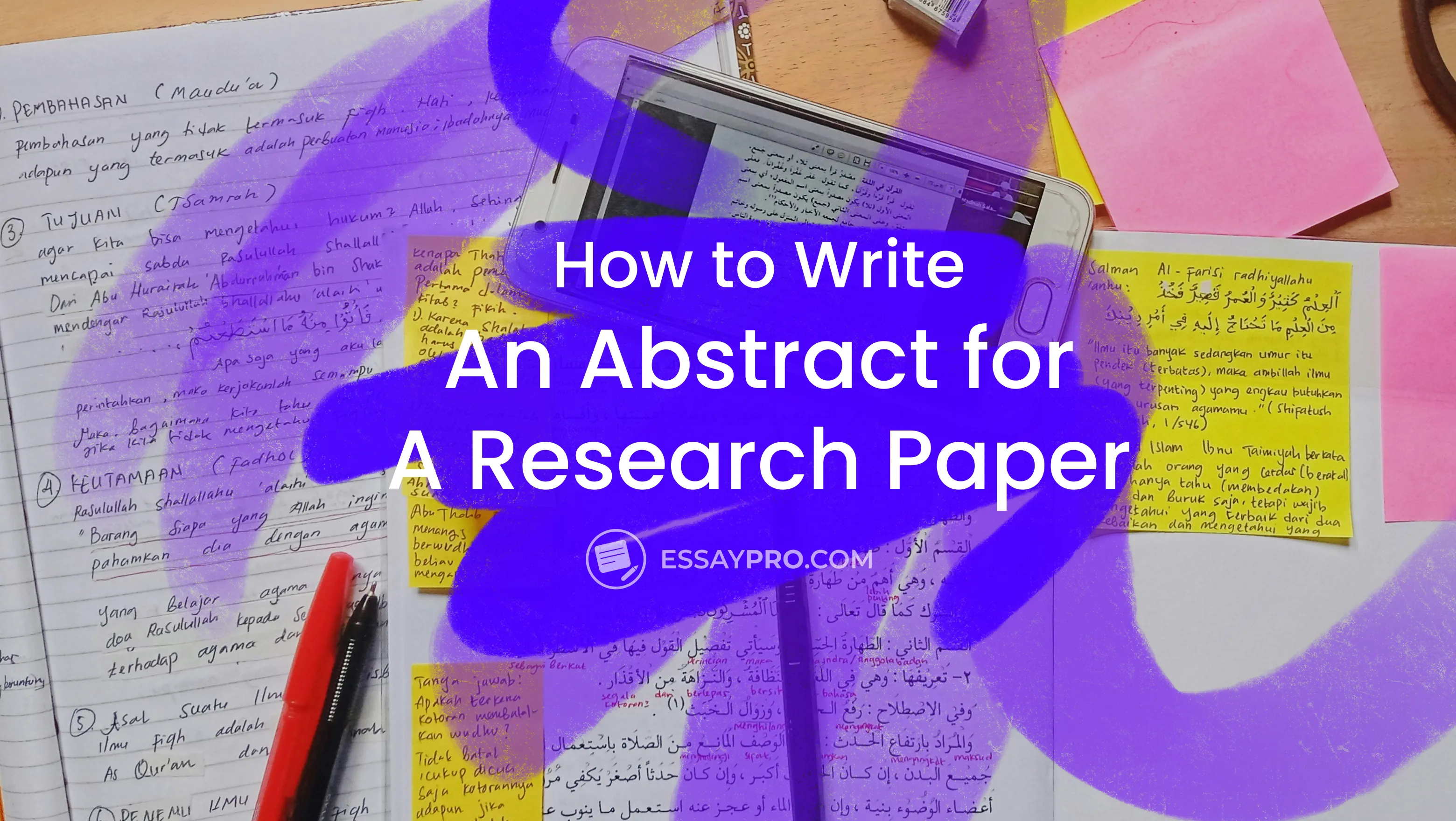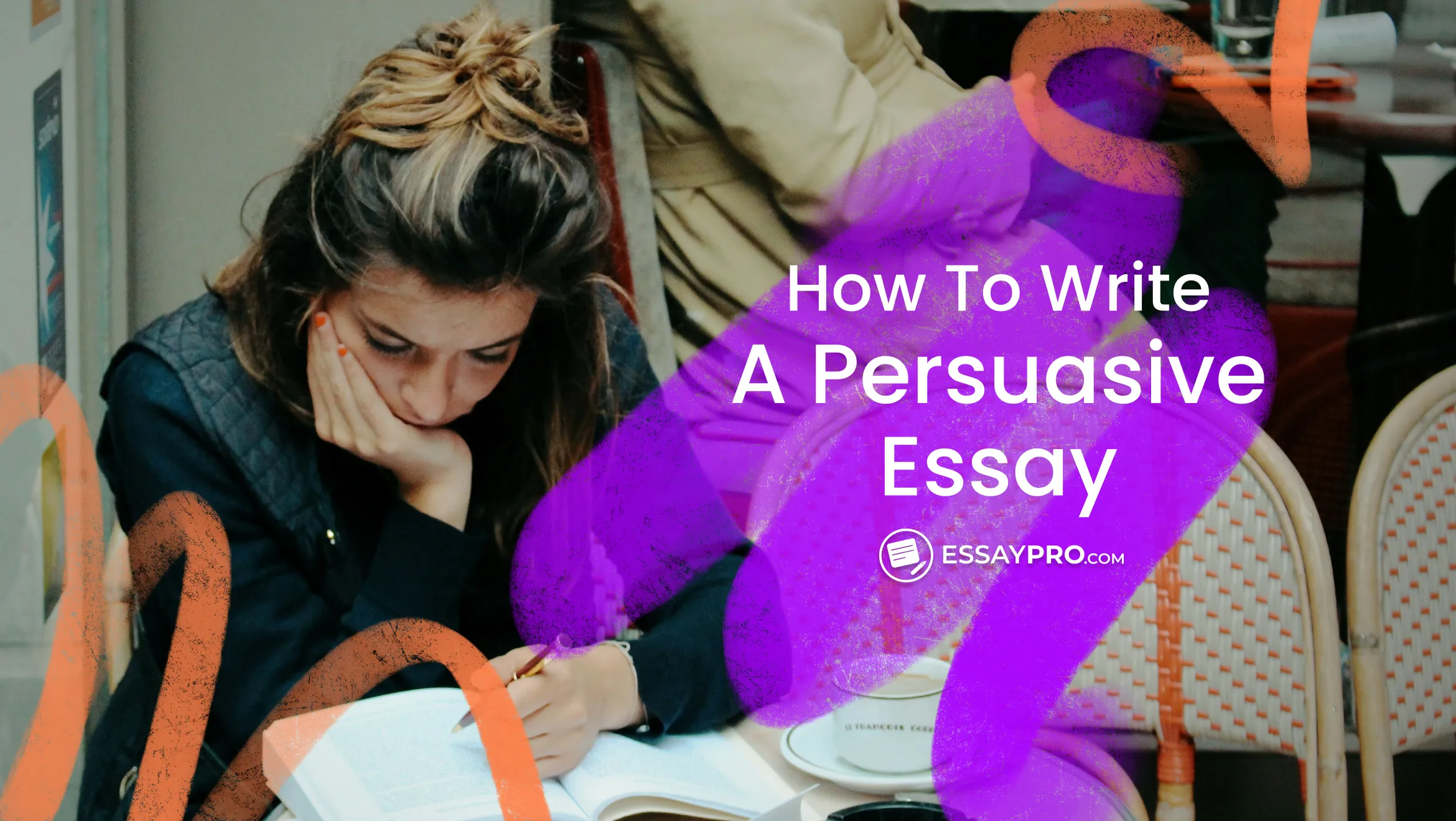Key Takeaways:
- An abstract is a brief summary of your research paper
- It includes your topic, question, methods, and findings
- Word count usually falls between 150 and 250 words
- The goal is to give readers a quick overview
- Clear, honest writing matters more than fancy phrasing
It’s strange how the tiniest part of your paper can feel like the hardest. You’ve written the chapters, sifted through sources, and pieced everything together, and then this short paragraph at the very beginning suddenly feels impossible. It’s just a few sentences, but somehow it stops you cold. What are you supposed to say? How do you squeeze your entire paper into something the length of a long text message?
That’s the whole point of this guide provided by our custom research papers writing service. We’ll help you cut through the usual noise and understand how to make abstract in research that actually says something!
What is an Abstract in a Research Paper?
An abstract for research paper is a short, standalone summary of your research paper. That’s the clean definition. But in real terms, it’s the moment when you stop being deep in the details and start telling someone else what all of it means.
It’s usually just one paragraph, tucked right under the title. Around 150 to 250 words. It doesn’t try to impress. It doesn’t need filler citations or long-winded setups. Just a compilation of the bones of your work, such as what question you asked, how you approached it, what turned up, and why it all matters.
If that’s all they read, it should still tell them something. What you did, why you did it, and what came out of it.
What is the Purpose of an Abstract in a Research Paper?
Most people won’t read your whole paper right away. Some won’t read it at all. What they will look at is the abstract. That’s the part that helps them figure out what you wrote about, how you approached it, and whether it’s even worth diving into.
It’s a quick way for someone to decide if your work speaks to what they need. And if it doesn’t, they’ll move on. If it does, you’ve done enough to get them through the door. That’s what the abstract is really for. That’s also your answer to the question: how to create abstract in research?
How Long Should an Abstract Be?
Not long; most fall somewhere between 150 and 250 words, but it depends. Some papers only need a quick 100-word summary. Others take a little more room to lay things out, especially if you’ve got data or results that need a bit of space.
The main thing is not to ramble. Don’t stuff it just to hit a number. Say what you need to say, then stop. If your school or journal gives you a word count, sure, follow it. If not, just keep it tight, clear, and readable. That’s all anyone’s asking for.


How to Choose Verb Tenses for Your Abstract
Tense matters more than you’d think, but it’s not something to stress over. Just remember:
Use the past tense when you talk about what you did. That includes your methods and results. Example:
- I surveyed 200 students, or The study found…
Then, switch to the present tense when you say what the paper shows or argues. Example:
- This paper explores… or The research highlights…
Plus, always trust your ear. If it sounds awkward when you read it out loud, there’s your answer.
The Contents of a Research Paper Abstract
These are the pieces that need to show up in your abstract:
- The context, background, general, and specific topic: What space does your work live in? Is it climate science, early childhood education, or political theory? Just give a quick sense of the general topic. You’re just helping the reader get their footing.
- Your central question and what you’re trying to figure out: This is the question or problem you focused on. Say it clearly. Don’t bury it in a big language. What were you genuinely curious about? What were you hoping to understand better?
- What others have already said in previous research: No need for name-dropping. Just briefly show that you’re not the first to care about this topic. A line or two about what earlier research has done or missed is enough to make it clear you’ve done your homework.
- The significance of this research topic and your goals: This is your chance to say, ‘Here’s why I bothered doing this.’ Are you approaching something from a new angle? Trying to fill a gap? Testing an assumption that never sat right with you? Be real here. It matters.
- The methods you used : How did you go about it? Interviews? Surveys? Textual analysis? Lab work? You don’t need every detail, but give people a rough sense of what your process looked like.
- Your main findings and conclusions: This is the heart of it. What came out of the work? You don’t have to overexplain, but don’t be vague either. State the main result, argument, or discovery.
- Why it’s worth knowing, i.e., implications of your findings: End with the impact. What should readers take away from this? Does it shift how we see something? Open up new questions? Help solve a problem?
Learn also: How to write a conclusion for a research paper with our step-by-step guide.
Examples of Abstract in Research
Reading tips are helpful, but seeing how something actually looks on the page is when you really start to get it. Below are sample abstracts from different fields, each research paper abstract example is written to fit the tone and expectations of its discipline.
Sample Abstract – Humanities
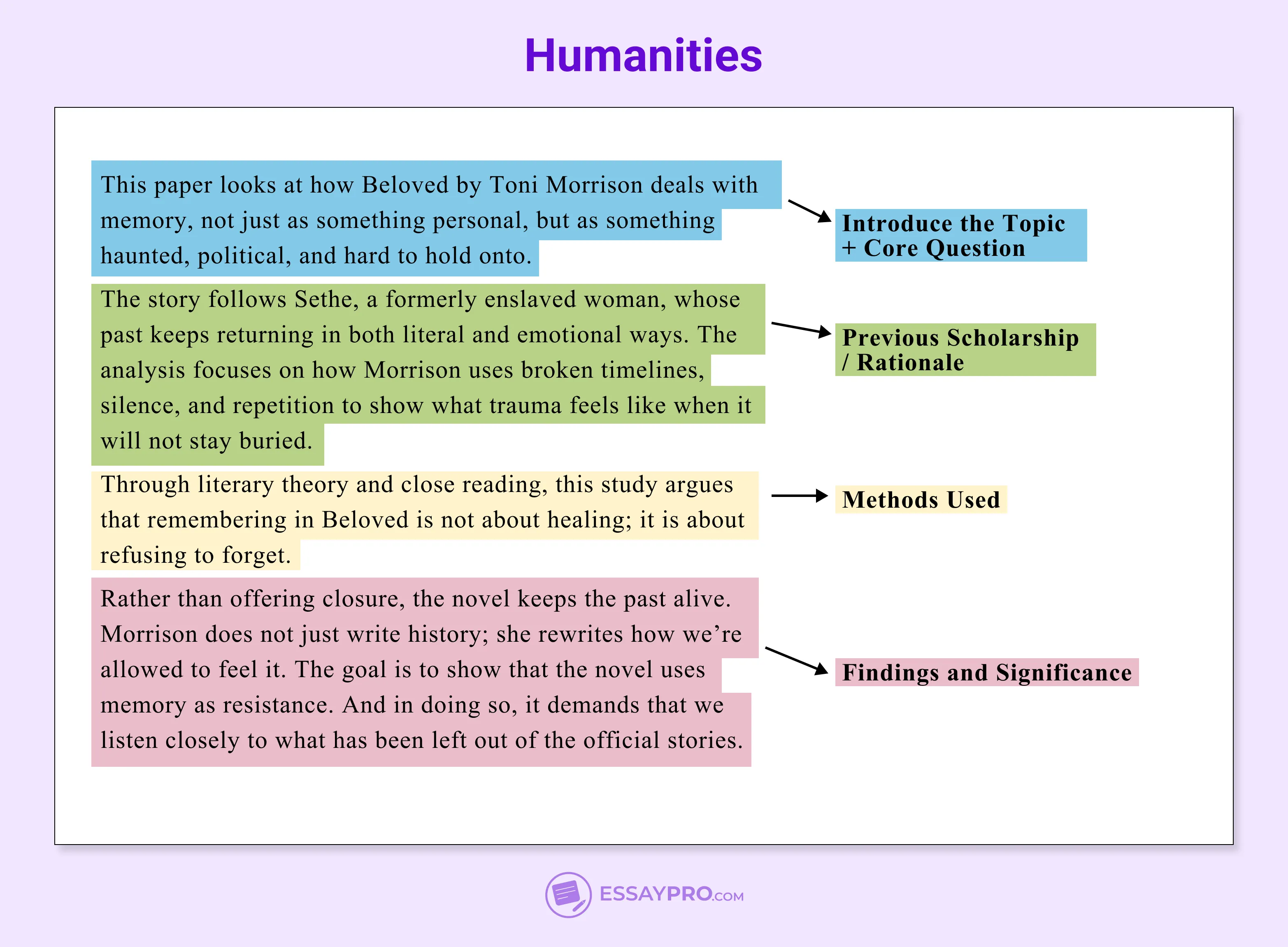
Humanities abstracts lean toward interpretation. There’s less data and more voice. This example of abstract in research is about the idea, the argument, and how you build it.
Sample Abstract – Social Sciences
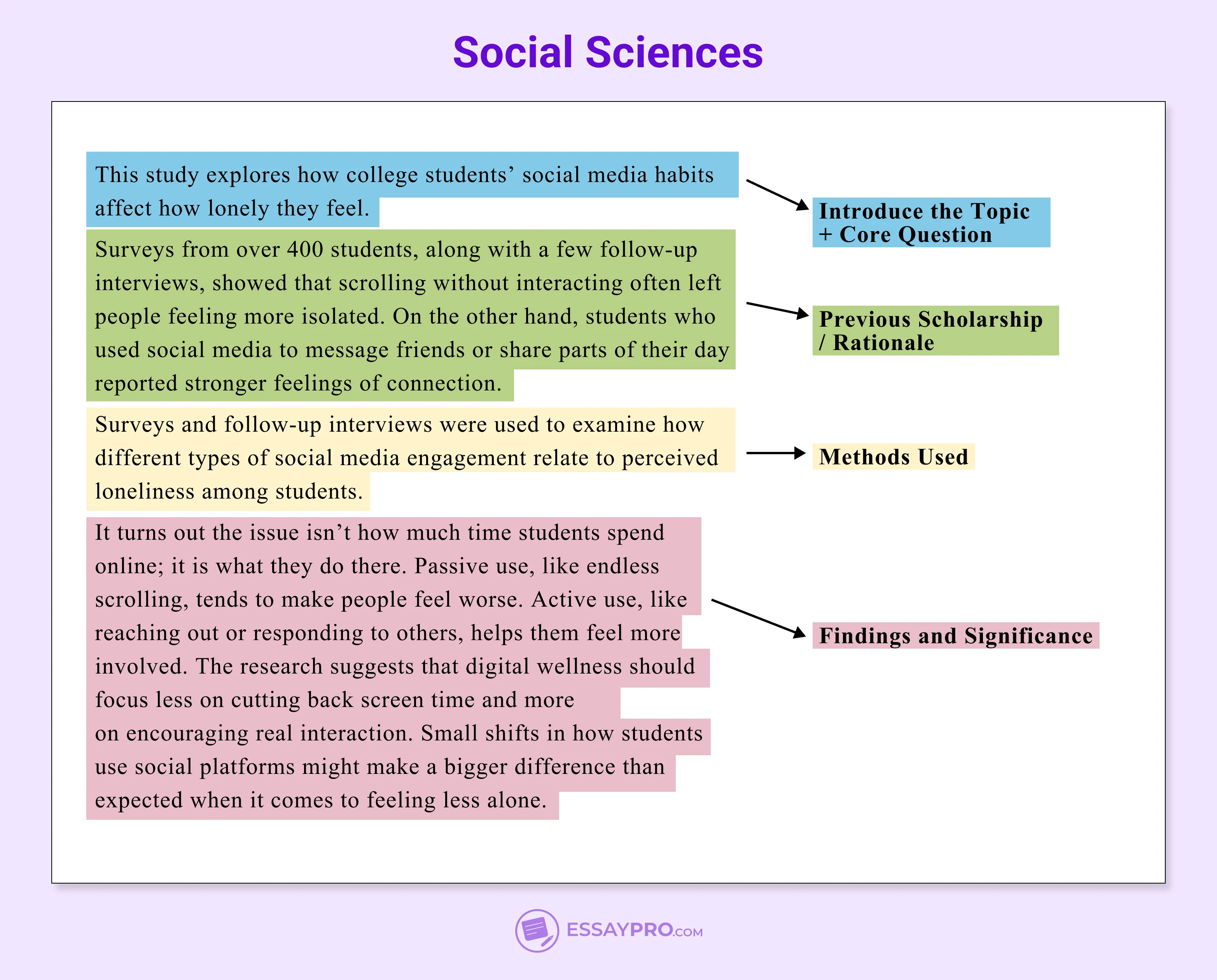
In social sciences, the abstract usually walks you through a question, a method, and a clear result. It’s practical, grounded, and tends to show its cards early.
Sample Abstract – Sciences
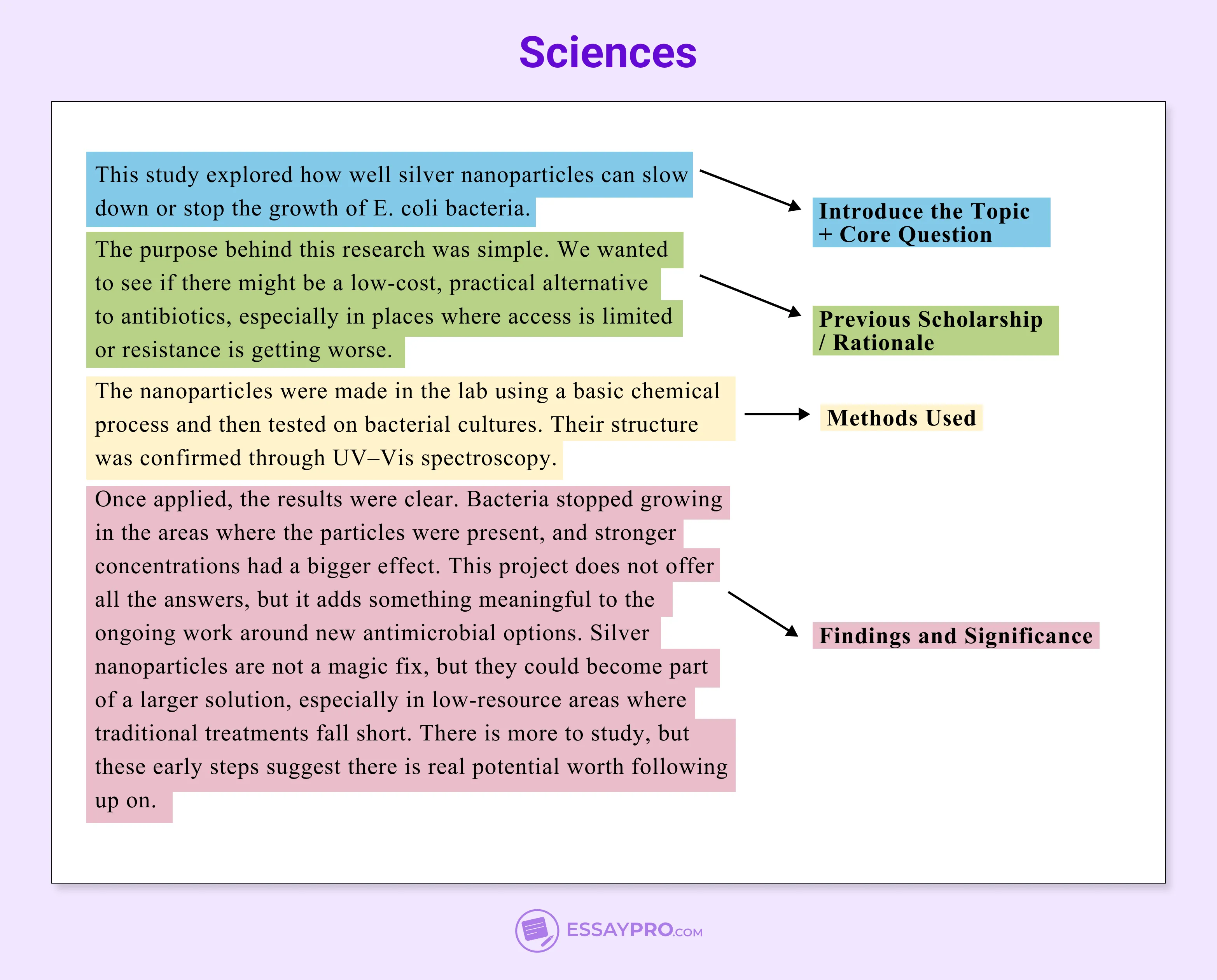
Science abstracts move quickly. They pack a lot into a short space and care most about the facts: what you tested, what happened, and what it might mean.
Sample Abstract – Visual Arts
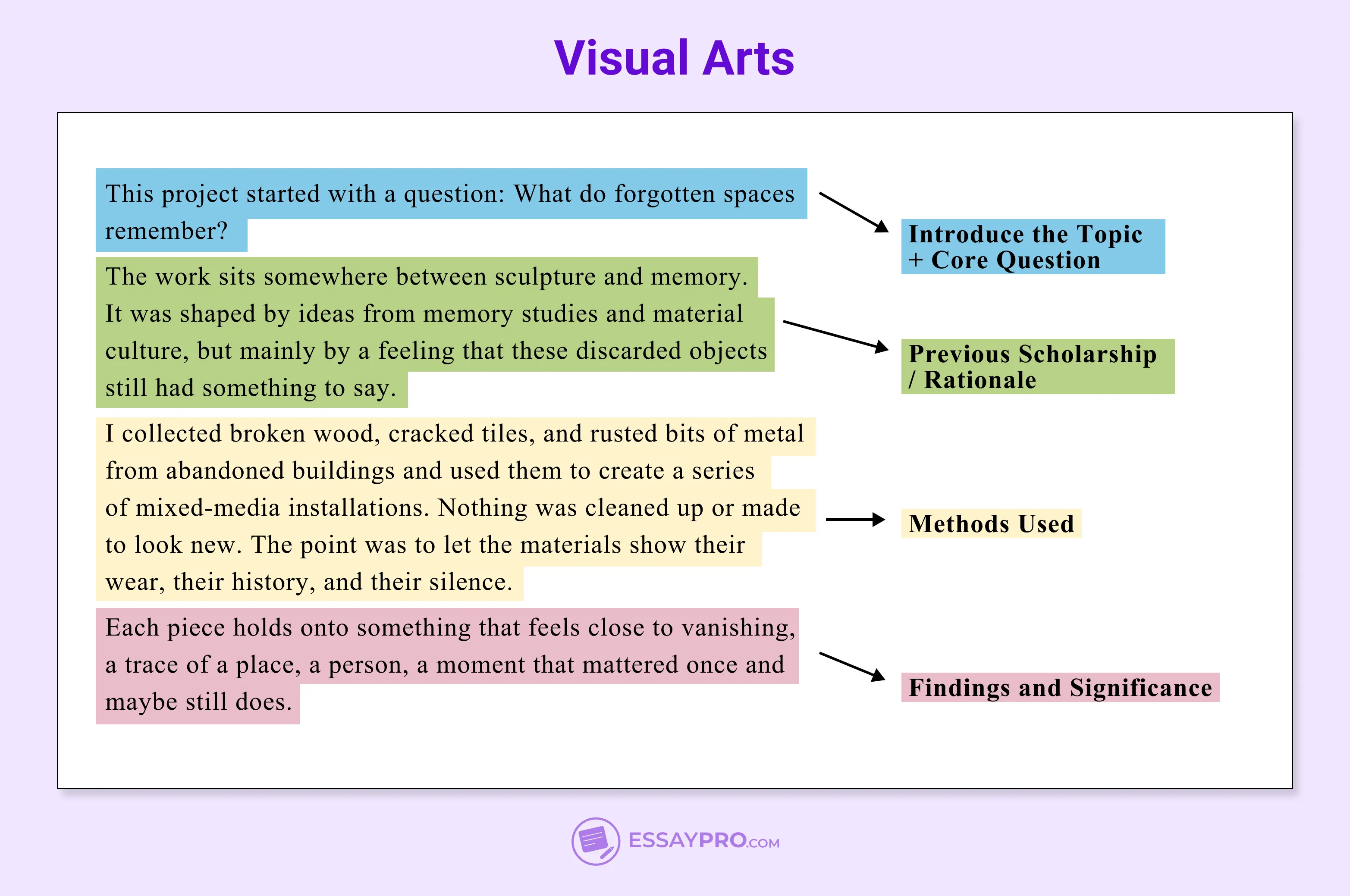
In the arts, abstracts sound different. They focus more on process, concept, and intention. You’re explaining your creative logic, not listing results.
Sample Abstract – Engineering

In engineering, keep it clean and straight to the point. Abstracts here usually highlight a design, how it was tested, and whether it worked.
Sample Structured Abstract
Some fields, like medicine or psychology, prefer abstracts with clear labels. These structured formats make it easier to scan and compare studies.
For inspiration, read our article on interesting research topics.
To Wrap Up
An abstract does not need to be perfect. It just needs to be clear. Say what you looked at, how you looked at it, what you found, and why it matters. Keep it simple. Keep it honest. If someone walks away understanding your work in under a minute, you did it right.
If you’re having trouble writing a compelling abstract or the entire paper, buy a research paper online and rest assured while we take care of it.
FAQ
How to Write an Abstract for a Research Paper?
Start with your main question. Mention how you explored it, what you found, and why it matters. Keep it short and real. No filler, no fluff.
What are the 5 Parts of an Abstract?
- Topic
- Research question
- Methods
- Key findings
- Why it matters

Daniel Parker
is a seasoned educational writer focusing on scholarship guidance, research papers, and various forms of academic essays including reflective and narrative essays. His expertise also extends to detailed case studies. A scholar with a background in English Literature and Education, Daniel’s work on EssayPro blog aims to support students in achieving academic excellence and securing scholarships. His hobbies include reading classic literature and participating in academic forums.
The Writing Center, University of Wisconsin–Madison. (n.d.). Writing an abstract for your research paper. https://writing.wisc.edu/handbook/assignments/writing-an-abstract-for-your-research-paper/

